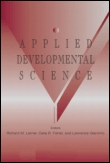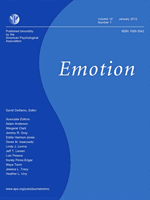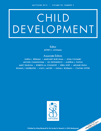
INTERNATIONAL JOURNAL OF BEHAVIORAL DEVELOPMENT
Scope & Guideline
Exploring the complexities of behavioral development across the lifespan.
Introduction
Aims and Scopes
- Lifespan Development:
The journal explores developmental processes from infancy through late adulthood, highlighting the dynamic interplay between biological, psychological, and social factors that influence behavior throughout life. - Cultural Contexts in Development:
Research published in this journal often examines how cultural differences shape behavioral development, emphasizing the importance of understanding development in various sociocultural settings. - Interdisciplinary Methodologies:
The journal encourages the use of diverse research methodologies, including longitudinal studies, psychometric evaluations, and qualitative approaches, to deepen insights into behavioral development. - Social and Emotional Development:
A consistent focus on social and emotional competencies in children and adolescents is prevalent, with studies examining factors such as peer relationships, parental influences, and emotional regulation. - Impact of Adversity and Resilience:
The journal addresses the effects of various adversities, including socioeconomic factors, trauma, and family dynamics, on behavioral outcomes, promoting research on resilience and protective factors.
Trending and Emerging
- Impact of Climate Change on Child Development:
Research focusing on the psychological impacts of climate change and environmental issues on children and adolescents is gaining traction, reflecting growing societal concerns about climate-related stressors. - Digital Behavior and Social Media Influence:
There is an increasing exploration of how digital interactions and social media use affect developmental outcomes, including social skills, emotional well-being, and identity formation in youth. - Intergenerational Studies:
Emerging themes include intergenerational studies that examine how experiences and behaviors of one generation influence the next, particularly in contexts of trauma, resilience, and cultural transmission. - Psychosocial Effects of COVID-19:
The journal has seen a rise in research addressing the psychosocial impacts of the COVID-19 pandemic on various age groups, highlighting the need for understanding resilience and coping mechanisms during crises. - Focus on Emotion Regulation:
A renewed emphasis on emotion regulation across various developmental stages is evident, with studies investigating its role in social relationships, academic success, and mental health.
Declining or Waning
- Traditional Parenting Styles:
While parenting styles remain a topic of interest, the focus on traditional categorizations (e.g., authoritative, authoritarian) is diminishing in favor of more nuanced explorations of parenting dynamics and contextual influences. - Static Models of Development:
There is a noticeable decline in studies applying static models of developmental assessments. Instead, there is a growing preference for dynamic, longitudinal approaches that better capture the complexities of change over time. - Generalized Child Behavior Assessments:
Research that relies on broad, generalized assessments of child behavior without consideration for specific contexts or cultural factors is becoming less common, as the field moves towards more targeted and context-sensitive methodologies.
Similar Journals

EUROPEAN JOURNAL OF PSYCHOLOGY OF EDUCATION
Exploring the intersection of psychology and education.Welcome to the European Journal of Psychology of Education, a leading scholarly publication dedicated to advancing the fields of developmental and educational psychology. Published by Springer, this esteemed journal boasts an impressive impact factor, firmly placing it in the Q1 quartile for both Developmental and Educational Psychology as well as Education as of 2023. With a Scopus rank of #171 out of 1543 in Social Sciences Education and a #63 ranking out of 360 in Psychology, it represents a vital resource for researchers, professionals, and students seeking to explore innovative educational practices and psychological theories from a European perspective. Founded in 1986, the journal has established itself as a cornerstone of contemporary research over the years and continues to publish high-quality articles that contribute significantly to the understanding of psychological principles in educational contexts. Although it does not currently operate under an open access model, its rigorous peer-review process ensures that only the most impactful studies are included, making it essential reading for those committed to advancing educational psychology.

DEVELOPMENTAL SCIENCE
Connecting Minds: Where Development Meets NeuroscienceDEVELOPMENTAL SCIENCE, published by Wiley, is a premier international journal dedicated to advancing the field of developmental psychology and cognitive neuroscience. With an ISSN of 1363-755X and an E-ISSN of 1467-7687, this journal has established itself as a vital resource for researchers and practitioners alike since its inception in 1998. The journal is esteemed for its rigorous peer-reviewed articles that explore key aspects of human development, contributing to its remarkable impact factor and prestigious rankings: it is categorized in Q1 in both Cognitive Neuroscience and Developmental and Educational Psychology, placing it in the top tiers of scholarly work. Notably, it holds an impressive Scopus rank of #30 out of 360 in Developmental and Educational Psychology and #19 out of 115 in Cognitive Neuroscience. The continuous exploration of developmental processes, education, and cognitive functions makes DEVELOPMENTAL SCIENCE an indispensable tool for those striving to deepen their understanding or contribute to these dynamic fields. Although the journal follows subscription-based access options, its high-quality findings offer invaluable insights for academicians, students, and professionals committed to the evolving landscape of developmental research.

Applied Developmental Science
Empowering researchers with cutting-edge perspectives on life-span studies.Applied Developmental Science is a leading academic journal dedicated to enhancing the understanding of human development across the lifespan. Published by Routledge Journals, Taylor & Francis Ltd, this esteemed journal stands out in its field with a remarkable impact factor and prestigious Q1 classification in Applied Psychology, Developmental and Educational Psychology, and Life-span and Life-course Studies, as of 2023. By focusing on empirical research and innovative theoretical perspectives, Applied Developmental Science serves as a vital resource for researchers, professionals, and students alike, fostering a deep understanding of developmental processes. The journal’s high rankings highlight its influence and commitment to advancing knowledge in developmental psychology. Although not an open-access publication, it provides invaluable insights for those engaged in developmental science, making it a cornerstone for academic inquiry and professional practice within the discipline.

EMOTION
Pioneering Research in Emotional ProcessesEMOTION is a leading peer-reviewed journal published by the American Psychological Association, focusing on the intricate dynamics of human emotions. With its ISSN 1528-3542 and E-ISSN 1931-1516, this esteemed journal has established itself as a pivotal resource in the fields of Psychology and Medicine, proudly ranking in the top quartile (Q1) according to the latest metrics and scoring a remarkable position as #22 out of 216 in the Scopus General Psychology category, placing it in the 90th percentile of its field as of 2023. Spanning from its inception in 2001 to 2024, EMOTION publishes cutting-edge research, theoretical articles, and empirical studies that advance our understanding of emotional processes and their implications for psychological well-being. While EMOTION is not an open-access journal, it remains a crucial platform for researchers, professionals, and students seeking to engage with and contribute to the burgeoning field of emotional psychology.

SOCIAL DEVELOPMENT
Advancing understanding of social dynamics.SOCIAL DEVELOPMENT is a prestigious journal published by WILEY, dedicated to advancing knowledge in the fields of developmental and educational psychology, sociology, and political science. With the ISSN 0961-205X and E-ISSN 1467-9507, this journal has been a vital resource since its inception in 1992 and continues to publish high-quality research until 2024. Recognized for its impact, it holds a Q2 ranking in Developmental and Educational Psychology and top Q1 placements in both Social Sciences (Miscellaneous) and Sociology and Political Science for 2023. The journal ranks 103rd out of 604 in the Social Sciences category, reflecting its significant contributions to the discipline. Although it does not offer open access, researchers and scholars can access its compelling articles through institutional subscriptions or direct purchase. Located in the United Kingdom, SOCIAL DEVELOPMENT is committed to fostering an understanding of social dynamics and promoting scholarly discussion on pressing social issues, making it an essential resource for academics, practitioners, and students alike.

Research in Human Development
Illuminating the Pathways of Human ProgressResearch in Human Development is a distinguished academic journal published by Routledge Journals, Taylor & Francis Ltd, focusing on the intricate processes of human development across various contexts. Established to meet the evolving needs of researchers and practitioners, this journal provides a platform for innovative studies within the fields of Developmental and Educational Psychology and Social Psychology. With its solid standing, as reflected by its 2023 Q2 classification in both categories and impressive Scopus rankings—#112 in Social Psychology and #133 in Developmental and Educational Psychology—this journal occupies a significant position in the academic landscape. The research published here is instrumental for those seeking to advance their understanding of psychological development and its social implications. Although it does not currently offer open access, the journal invites academics, students, and professionals to engage with its compelling content, which spans from 2010 to 2024 and promises to contribute substantially to the discourse in human development.

CHILD DEVELOPMENT
Exploring the multifaceted journey of child development.CHILD DEVELOPMENT, published by WILEY, stands as a premier journal in the fields of developmental and educational psychology, education, pediatrics, perinatology, child health, and social work. Established in 1945, it has consistently maintained a strong impact, underscored by its 2023 Q1 ranking in multiple relevant categories, as well as its esteemed positions within Scopus rankings, including a remarkable 14th place in Pediatrics. The journal serves as a vital resource for researchers and professionals, offering rigorous peer-reviewed articles that explore pivotal aspects of child development through a multidisciplinary lens. Although it does not currently offer open access options, CHILD DEVELOPMENT remains influential, addressing critical topics in child psychology, policy implications, and educational practices. Researchers and students alike will find the journal’s comprehensive scope instrumental in advancing their understanding and fostering an evidence-based approach to contemporary child development issues.

Social and Personality Psychology Compass
Innovating Research, Shaping UnderstandingSocial and Personality Psychology Compass, published by WILEY, stands as a leading voice in the realm of social psychology, achieving a commendable Q1 ranking in the 2023 category assessments. With an E-ISSN of 1751-9004, this journal serves as a significant platform for the dissemination of cutting-edge research and scholarly discourse, covering various facets of social and personality psychology. Since its inception in 2011 and with a convergence extending until 2024, it has continually featured innovative studies and critical reviews that shape contemporary understanding in the field. As a highly regarded resource, ranked 75th out of 310 in the Scopus database, Social and Personality Psychology Compass caters to a diverse audience of researchers, professionals, and students, fostering an environment for academic growth and collaborative exploration in psychology. Although it does not currently offer open access, the journal remains dedicated to ensuring broad availability of its impactful findings.

PSYCHOLOGICA BELGICA
Innovating psychological research since 1975.PSYCHOLOGICA BELGICA is a distinguished open access journal published by UBIQUITY PRESS LTD, focusing on the broad and diverse field of psychology. Since its inception in 1975, this journal has been dedicated to the dissemination of high-quality research, making it a vital resource for researchers, practitioners, and students alike. With an impact factor that reflects its significant contribution to the field, PSYCHOLOGICA BELGICA stands out in the Q2 category of miscellaneous psychology and is ranked 75th out of 216 journals in General Psychology according to Scopus. The journal's open access model, adopted in 2004, ensures that the latest research findings are freely accessible, promoting a wider engagement with psychological science. With a commitment to fostering academic collaboration and innovation, PSYCHOLOGICA BELGICA continues to be an essential platform for advancing psychological knowledge and exploring contemporary issues within the discipline.

Revista de Psicologia Clinica con Ninos y Adolescentes
Championing the mental well-being of children and adolescents.Welcome to the Revista de Psicologia Clinica con Ninos y Adolescentes, an esteemed academic journal published by UNIV MIGUEL HERNANDEZ, DEPT PSICOLOGIA, dedicated to advancing knowledge in the fields of clinical psychology, developmental psychology, and pediatric mental health. Since its inception in 2014, this Open Access journal has garnered a reputation for its commitment to disseminating cutting-edge research and practical insights, serving as an invaluable resource for researchers, practitioners, and students alike. With an impressive Q2 categorization across various disciplines in the 2023 rankings—including Clinical Psychology and Pediatrics—the journal holds significant merit in its rankings, demonstrating robust scholarly engagement. Nestled within the vibrant academic landscape of Spain, the journal aims to foster interdisciplinary collaboration and promote awareness of psychological issues affecting children and adolescents. By publishing high-quality empirical studies, theoretical papers, and reviews, the Revista de Psicologia Clinica con Ninos y Adolescentes plays a pivotal role in advancing the scientific dialogue within the field, making it an essential resource for anyone dedicated to improving mental health outcomes for younger populations.